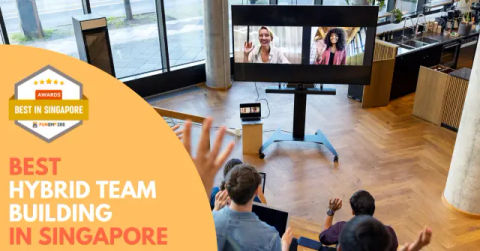Teamwork Singapore

Teamwork is the cornerstone of success in any workplace, fostering collaboration, innovation, and mutual support among team members.
In the dynamic landscape of Singaporean workplaces, where efficiency and harmony are prized, effective teamwork plays a pivotal role in driving organizational achievements.
This article explores effective teamwork in Singaporean workplaces, highlighting its advantages, essential elements, strategies to encourage it, and examples of successful use.
Understanding the Dynamics of Singaporean Workplaces
Collaborative Work Culture
In Singapore, workplaces are characterized by a strong emphasis on collaboration and cooperation. With diverse cultural backgrounds and perspectives, teams in Singaporean organizations strive to achieve synergy and harmony in their operations.
Challenges Faced
Despite the cultural inclination towards teamwork, Singaporean workplaces encounter challenges such as communication barriers, conflicting priorities, and hierarchical structures that may impede effective collaboration. Understanding these challenges is crucial for devising strategies to overcome them and enhance teamwork.
Benefits of Effective Teamwork in Singaporean Context
- Increased Productivity: Collaborative efforts lead to the pooling of skills and efforts, significantly boosting productivity levels.
- Enhanced Creativity and Innovation: Diverse team members bring varied perspectives and ideas, fostering innovation and creative solutions to problems.
- Improved Employee Morale: Working as part of a cohesive team improves job satisfaction, motivation, and morale among employees.
- Faster Problem-Solving: Collective brainstorming and decision-making processes enable teams to arrive at solutions more quickly and efficiently.
- Better Risk Management: Teamwork allows for the sharing of risks and responsibilities, providing a safety net for tackling challenging tasks and decisions.
- Streamlined Communication: Effective teamwork promotes open communication, ensuring all team members are on the same page and working towards common goals.
- Enhanced Learning Opportunities: Individuals within a team have the chance to learn from each other’s experiences and skills, fostering personal and professional development.
- Increased Flexibility: Teams that work well together can adapt more swiftly to changes and unexpected situations, maintaining project momentum.
- Stronger Work Relationships: Teamwork fosters stronger relationships and trust among coworkers, which contribute to a more pleasant and cohesive work environment.
- Superior Customer Satisfaction: The collaboration within teams often leads to higher quality outcomes and services, directly translating into increased customer satisfaction.
Key Components of Effective Teamwork
1. Clear Communication Channels
Establishing open and transparent communication channels ensures that information flows freely among team members, fostering clarity, alignment, and trust.
2. Mutual Respect and Trust
Building a culture of respect and trust among team members promotes psychological safety, encouraging individuals to voice their opinions, share ideas, and take calculated risks without fear of judgment or reprisal.
3. Openness to Feedback and Constructive Criticism
Encouraging a culture of feedback enables continuous learning and improvement within Singaporean teams, helping individuals to identify areas for growth and development while fostering a culture of accountability and excellence.
4. Alignment with Organizational Goals and Values
Ensuring that team objectives are aligned with the broader goals and values of the organization reinforces a sense of purpose and direction, motivating team members to work cohesively towards shared outcomes.
5. Defined Roles and Responsibilities
Clearly defining roles and responsibilities within the team clarifies expectations and minimizes confusion, enabling each member to contribute effectively towards common goals.
Strategies for Fostering Effective Teamwork in Singaporean Workplaces
1. Encouraging Open Communication
Regular team meetings, brainstorming sessions, and the use of collaborative tools facilitate open communication and information sharing among team members, fostering a culture of transparency and inclusivity.
2. Establishing Clear Goals and Objectives
Setting SMART (Specific, Measurable, Achievable, Relevant, Time-bound) goals and objectives provides teams with a clear sense of direction and purpose, ensuring alignment towards common outcomes.
3. Promoting a Culture of Collaboration
Creating opportunities for cross-functional collaboration, knowledge-sharing sessions, and team-building activities fosters a sense of camaraderie and solidarity among team members, strengthening interpersonal relationships and collective bonds.
4. Providing Training and Development
Investing in training workshops and skill development programs equips team members with the necessary tools and competencies to collaborate effectively, enhancing their ability to navigate challenges and seize opportunities in the Singaporean workplace.
5. Recognizing and Rewarding Teamwork
Acknowledging and celebrating team successes, both big and small, reinforces positive behaviors and motivates continued collaboration, fostering a culture of appreciation and recognition within Singaporean organizations.
Teamwork Singapore
Effective teamwork is not just a desirable trait but a critical imperative for success in Singaporean workplaces.
By fostering collaboration, communication, and trust among team members, organizations can unlock the full potential of their workforce and achieve sustainable growth and prosperity in the competitive business landscape of Singapore.
Embracing the power of effective teamwork is not only a strategic advantage but a cultural ethos that drives excellence and innovation in the dynamic realm of Singaporean business.
Frequently Asked Questions (FAQs)
If you have any questions about Teamwork in Singapore, you can refer to the frequently asked questions (FAQ) about the Power of Effective Teamwork in Singapore below:
How does diversity within teams affect teamwork in Singapore?
Diversity in teams can significantly enhance creativity and innovation by bringing different perspectives, experiences, and ideas to the table. In Singapore’s multicultural business environment, leveraging diversity is key to fostering dynamic and effective teamwork.
What are some common challenges to effective teamwork in Singaporean workplaces, and how can they be addressed?
Common challenges include communication barriers, cultural differences, and unclear roles and responsibilities. These can be addressed by prioritizing clear, open communication, fostering understanding and respect for diverse cultures, and clearly defining each team member’s role and responsibilities.
How important is leadership in fostering effective teamwork in Singaporean organizations?
Leadership plays a crucial role in setting the tone for teamwork. Effective leaders in Singapore encourage open communication, provide clear direction, support team collaboration, and recognize and celebrate teamwork, thereby fostering a strong team culture.
Can technology improve teamwork in Singaporean workplaces? How?
Yes, technology can significantly improve teamwork by facilitating seamless communication, collaboration, and project management, regardless of geographical locations. Tools like digital workspaces, project management software, and communication platforms can enhance efficiency and engagement within teams.
How can organizations measure the effectiveness of their teamwork efforts?
Organizations can measure teamwork effectiveness through performance metrics related to project completion rates, quality of work produced, employee satisfaction surveys, customer feedback, and by monitoring the achievement of specific, team-based objectives and outcomes.







